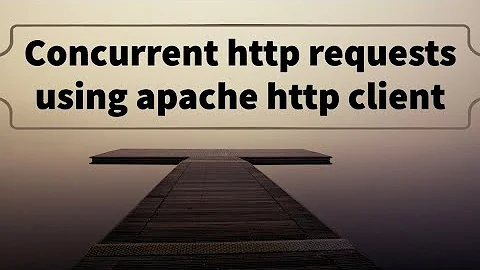Java - DefaultHttpClient and "Host" header [Apache HttpComponent]
Solution 1
My fault. Actually the DefaultHttpClient do adds the Host header, as required by the HTTP specification.
My problem was due to an other custom header I was adding before whose value ended with
"\r\n". This has invalidated all the subsequent headers added automatically by DefaultHttpClient.
I was doing something like:
HttpUriRequest request = new HttpGet("http://www.myapp.com");
org.apache.http.client.HttpClient client = new DefaultHttpClient();
request.addHeader(new BasicHeader("X-Custom-Header", "Some Value\r\n");
HttpResponse httpResponse = client.execute(request);
that generated the following Header sequence in the HTTP request:
GET /index.html HTTP/1.1
X-Custom-Header: Some value
Host: www.example.com
The space between X-Custom-Header and Host invalidated the Host header.
Fixed with:
HttpUriRequest request = new HttpGet("http://www.myapp.com");
org.apache.http.client.HttpClient client = new DefaultHttpClient();
request.addHeader(new BasicHeader("X-Custom-Header", "Some Value");
HttpResponse httpResponse = client.execute(request);
That generates:
GET /index.html HTTP/1.1
X-Custom-Header: Some value
Host: www.example.com
Solution 2
Just set the host header on the request using addHeader.
Related videos on Youtube
Mark
Updated on June 04, 2022Comments
-
 Mark almost 2 years
Mark almost 2 yearsI'm submitting multiple HTTP Requests via a DefaultHttpClient. The problem is that the "Host" header is never set in the request. For example by executing the following GET request:
HttpUriRequest request = new HttpGet("http://www.myapp.com"); org.apache.http.client.HttpClient client = new DefaultHttpClient(); HttpResponse httpResponse = client.execute(request);The generated request object doesn't set the mandatory "Host" header with the value:
Host: myapp.comAny tips?
-
 Steve HHH over 10 yearsGreat answer. I was able to set a custom value for
Steve HHH over 10 yearsGreat answer. I was able to set a custom value forHostand confirm that it worked by getting djce.org.uk/dumprequest. That page dumps back the headers it receives, and sure enough, the value ofHostwas what I set it to (notdjce.org.uk, which is what it would be if the Host value had not been changed). -
MH. about 9 yearsGood catch! In my case (on Android) I was Base64 encoding a header value with
Base64.DEFAULT, which includes line terminators. As a result all key-value pairs coming after the custom header got messed up (couldn't even see them when running the request through a proxy). Switching toBase64.NO_WRAPsolved my problem, as it omits all line terminators (that is, the output is one long line).






